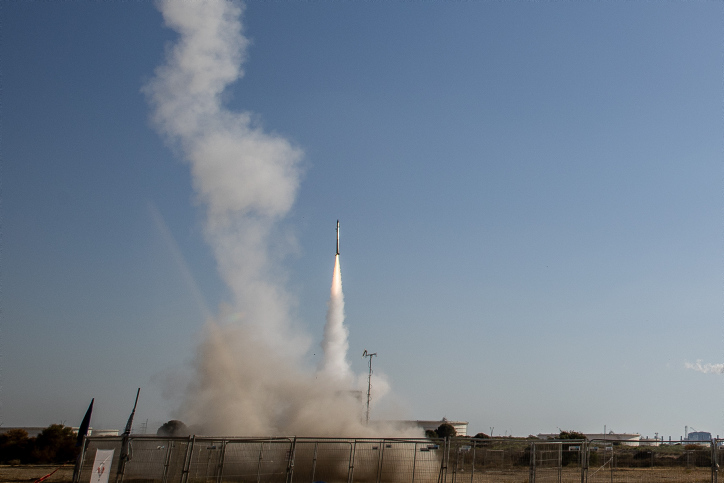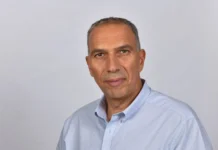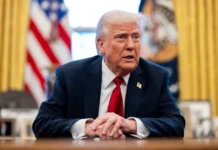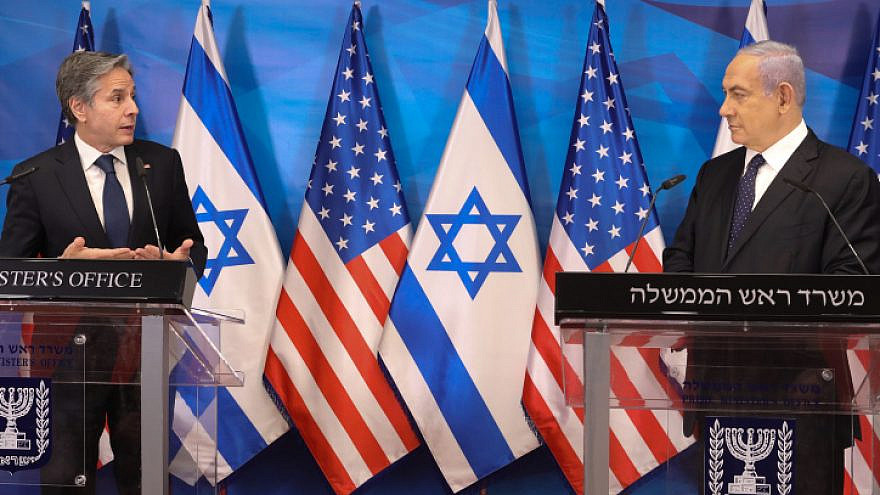U.S. Secretary of State Antony Blinken met with Israeli Prime Minister Benjamin Netanyahu on Tuesday in Jerusalem on the first leg of a regional tour that will include stops in Ramallah, Jordan and Egypt. The two leaders discussed the latest round of fighting between Israel and Hamas, Iran and the ongoing nuclear-deal talks in Vienna, and the recent surge of anti-Semitic attacks in the United States.
At a press conference following the meeting, Blinken said that U.S. President Joe Biden had sent him to the region for four primary reasons.
“First, to demonstrate the commitment of the United States to Israel’s security; to start to work toward greater stability and reduce tensions in the West Bank and Jerusalem; to support urgent humanitarian and reconstruction assistance for the Gaza Strip to benefit the Palestinian people; and to continue to rebuild our relationship with the Palestinian people and the Palestinian Authority.”
The U.S. administration believes that to prevent a return to violence, last week’s ceasefire between Israel and Hamas must be used “to address a larger set of underlying issues and challenges,” said Blinken, beginning with the “grave” humanitarian situation in Gaza.
“At the same time, we need to work to expand opportunity for Palestinians in Gaza and in the West Bank, including by strengthening the private sector, expanding trade and investment, and other means. Assistance and investment like these will help foster a more stable environment that benefits Palestinians and also benefits Israelis,” he said.
The two leaders also discussed the issue of Israeli citizens currently being held by Hamas in Gaza, as well as how to foster economic growth for Judea and Samaria with international cooperation and participation, said Netanyahu.
The U.S. secretary of state said that he had underscored to the Israeli prime minister Biden’s “crystal-clear” message of support for Israel’s right to defend itself.
“For the president, I think as many of you know, this commitment is personal. It runs deep,” said Blinken. Biden, he said, has been one of Israel’s most steadfast supporters for the past 50 years, having worked closely with every Israeli prime minister starting with Golda Meir.
Netanyahu thanked Blinken and the president for their firm support of Israel’s right to self-defense, including in the form of replenishments for Israel’s Iron Dome air-defense system.
“I have to say that Secretary Blinken, in a previous capacity, in 2014, when we had another round of engagement against Hamas aggression, supported us by having Iron Dome replenishments—a quarter of a billion dollars—that you personally shepherded through the system very quickly, and we remember it and we’re very grateful to you,” said Netanyahu.
“You are giving meaning to this now again with replenishments of Iron Dome interceptors that save civilian lives on both sides. We’re grateful for that, too,” he added.
The Israeli leader also said that he and Blinken had discussed how to work together to prevent Hamas from rearming itself.

‘I hope the U.S. will not go back to the old JCPOA’
The United States would continue to strengthen “all aspects” of the “longstanding partnership” between the two countries—not only with regard to Hamas but also with respect to Iran, said Blinken.
“That includes consulting closely with Israel, as we did today, on the ongoing negotiations in Vienna around a potential return to the Iran nuclear agreement, at the same time as we continue to work together to counter Iran’s destabilizing actions in the region,” he said.
Of all the regional issues the two leaders had discussed, “none is greater than Iran,” said Netanyahu.
“And I can tell you that I hope that the United States will not go back to the old JCPOA [Joint Comprehensive Plan of Action] because we believe that deal paves the way for Iran to have an arsenal of nuclear weapons with international legitimacy,” he added.
Regardless of the outcome of the talks in Vienna, said Netanyahu, Israel would reserve the right to defend itself against “a regime committed to our destruction, committed to getting the weapons of mass destruction for that end.”
The Israeli prime minister called on the U.S. administration to work together with Israel to expand normalization between Israel and the Arab and Muslim world, and to strengthen those treaties that have already been signed.
With regard to peace with the Palestinians, Netanyahu said, “I think President Biden was absolutely correct when he said you’re not going to get peace until Israel is recognized as an independent Jewish state, and that is the key.”
Blinken noted that he and Netanyahu had discussed the intercommunal violence that erupted in Israel during the recent conflict with Hamas, and said that “to heal these wounds will take leadership at every level of society, from elected officials, to community leaders, to neighbors.”
The United States very much welcomed the statements of the prime minister and members of his government condemning the attacks, “regardless of whom they targeted,” he added.
“The prime minister and I had a chance to discuss other steps that need to be taken by leaders on both sides to set a better course for their shared future. As President Biden has said, we believe that Palestinians and Israelis equally deserve to live safely and securely, to enjoy equal measures of freedom, opportunity and democracy, and to be treated with dignity,” said Blinken.
“In our own country, in the United States, we witnessed a shocking eruption of anti-Semitic attacks. As President Biden said just yesterday, they are despicable and they must stop,” he added.
Netanyahu expressed his gratitude to Blinken and Biden for their strong statements against anti-Semitism, saying, “you took a bold position, a clear position, and we appreciate it. I think all decent people, decent people everywhere, appreciate that stance.”
Blinken concluded his remarks by noting, “There’s a lot of hard work ahead, to restore hope, respect and some trust across communities. But we’ve seen the alternative, and I think that should encourage all of us to redouble our efforts to preserve the peace, and improve the lives of Palestinians and Israelis alike.”


























